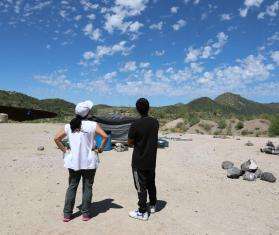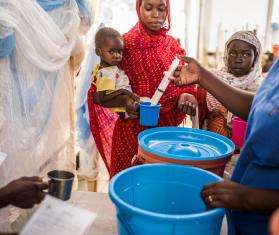The health sector is responsible for around 5 percent of carbon emissions worldwide. Doctors Without Borders/Médecins Sans Frontières (MSF) is trying to solve this problem as the devastating impacts of the climate emergency are increasingly felt across the world.
We have launched an initiative to find alternatives to single-use surgical face masks—one of the items most used by MSF medical staff across our projects worldwide.
Single-use medical items constitute an significant share of emissions generated by the health sector. They account for nearly 12 percent of emissions produced byproducts MSF purchases. They also create a lot of waste, which must be disposed of safely.

“We went from using some 50,000 masks per year in 2011 to over 500,000 in 2023,” said Dr. Monica Rull, medical director of the MSF’s operational center in Geneva, Switzerland. “Knowing that our own practices contribute to harming the environment—and therefore also the very people we aim to assist, we were aware that we would have to find another way.”
Helping the planet without compromising quality of care
In June 2023, MSF medical teams in Mozambique and Kyrgyzstan started a pilot initiative to replace single-use surgical masks with washable masks that can be used up to 40 times.

The objective was to compare the environmental impact of the single-use mask versus the new reusable version and determine whether the latter can work logistically in the different settings MSF works in. In partnership with the Technische Universität Berlin, we carried out a life-cycle assessment of the masks “from cradle to grave”—covering the material used to produce and package the masks, transport to the manufacturing facility and to the point of use, any eventual reprocessing, and final disposal. This assessment showed that the reusable mask significantly outperformed the single-use model. MSF staff also generally preferred the reusable mask, saying it was more comfortable to wear.
Looking ahead
The experience in Kyrgyzstan and Mozambique showed that it is not only feasible to reduce single-use surgical masks, but also have a positive impact on the environment and reduce carbon emissions without compromising quality of care or the safety of patients and medical staff. The long-term aim is to replace a significant proportion of single-use masks with more sustainable alternatives across MSF medical projects. With results from the pilot in hand, the next step is to roll-out the reusable masks as soon as possible.
“As health workers, we understand the impacts of climate change very well,” said Nelson Domingos Nuvunga, an MSF nurse in Mozambique who is encouraging his colleagues to use the reusable masks. “But also, I think it’s our duty as human beings, to save our planet.”
Every effort counts. Changing just one mask won’t make a difference, but changing many masks will.
The mask project is just one initiative within MSF’s larger effort to be more environmentally responsible. MSF has pledged to reduce its carbon emissions by at least 50 percent by 2030, compared to 2019 levels.




